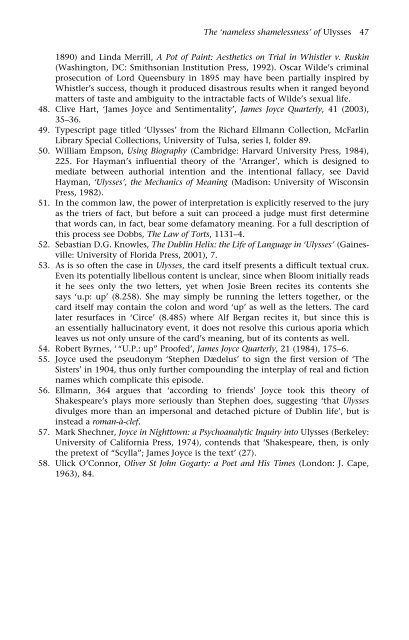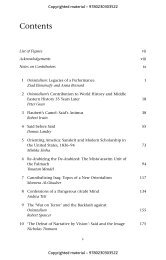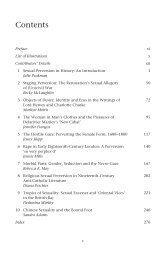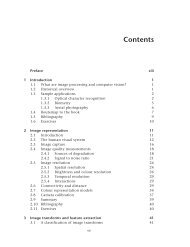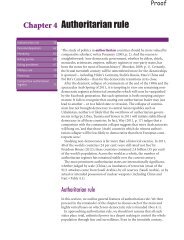The Nameless Shamelessness of Ulysses - Palgrave
The Nameless Shamelessness of Ulysses - Palgrave
The Nameless Shamelessness of Ulysses - Palgrave
You also want an ePaper? Increase the reach of your titles
YUMPU automatically turns print PDFs into web optimized ePapers that Google loves.
<strong>The</strong> ‘nameless shamelessness’ <strong>of</strong> <strong>Ulysses</strong> 47<br />
1890) and Linda Merrill, A Pot <strong>of</strong> Paint: Aesthetics on Trial in Whistler v. Ruskin<br />
(Washington, DC: Smithsonian Institution Press, 1992). Oscar Wilde’s criminal<br />
prosecution <strong>of</strong> Lord Queensbury in 1895 may have been partially inspired by<br />
Whistler’s success, though it produced disastrous results when it ranged beyond<br />
matters <strong>of</strong> taste and ambiguity to the intractable facts <strong>of</strong> Wilde’s sexual life.<br />
48. Clive Hart, ‘James Joyce and Sentimentality’, James Joyce Quarterly, 41 (2003),<br />
35–36.<br />
49. Typescript page titled ‘<strong>Ulysses</strong>’ from the Richard Ellmann Collection, McFarlin<br />
Library Special Collections, University <strong>of</strong> Tulsa, series I, folder 89.<br />
50. William Empson, Using Biography (Cambridge: Harvard University Press, 1984),<br />
225. For Hayman’s influential theory <strong>of</strong> the ‘Arranger’, which is designed to<br />
mediate between authorial intention and the intentional fallacy, see David<br />
Hayman, ‘<strong>Ulysses</strong>’, the Mechanics <strong>of</strong> Meaning (Madison: University <strong>of</strong> Wisconsin<br />
Press, 1982).<br />
51. In the common law, the power <strong>of</strong> interpretation is explicitly reserved to the jury<br />
as the triers <strong>of</strong> fact, but before a suit can proceed a judge must first determine<br />
that words can, in fact, bear some defamatory meaning. For a full description <strong>of</strong><br />
this process see Dobbs, <strong>The</strong> Law <strong>of</strong> Torts, 1131–4.<br />
52. Sebastian D.G. Knowles, <strong>The</strong> Dublin Helix: the Life <strong>of</strong> Language in ‘<strong>Ulysses</strong>’ (Gainesville:<br />
University <strong>of</strong> Florida Press, 2001), 7.<br />
53. As is so <strong>of</strong>ten the case in <strong>Ulysses</strong>, the card itself presents a difficult textual crux.<br />
Even its potentially libellous content is unclear, since when Bloom initially reads<br />
it he sees only the two letters, yet when Josie Breen recites its contents she<br />
says ‘u.p: up’ (8.258). She may simply be running the letters together, or the<br />
card itself may contain the colon and word ‘up’ as well as the letters. <strong>The</strong> card<br />
later resurfaces in ‘Circe’ (8.485) where Alf Bergan recites it, but since this is<br />
an essentially hallucinatory event, it does not resolve this curious aporia which<br />
leaves us not only unsure <strong>of</strong> the card’s meaning, but <strong>of</strong> its contents as well.<br />
54. Robert Byrnes, ‘ “U.P.: up” Pro<strong>of</strong>ed’, James Joyce Quarterly, 21 (1984), 175–6.<br />
55. Joyce used the pseudonym ‘Stephen Dædelus’ to sign the first version <strong>of</strong> ‘<strong>The</strong><br />
Sisters’ in 1904, thus only further compounding the interplay <strong>of</strong> real and fiction<br />
names which complicate this episode.<br />
56. Ellmann, 364 argues that ‘according to friends’ Joyce took this theory <strong>of</strong><br />
Shakespeare’s plays more seriously than Stephen does, suggesting ‘that <strong>Ulysses</strong><br />
divulges more than an impersonal and detached picture <strong>of</strong> Dublin life’, but is<br />
instead a roman-à-clef.<br />
57. Mark Shechner, Joyce in Nighttown: a Psychoanalytic Inquiry into <strong>Ulysses</strong> (Berkeley:<br />
University <strong>of</strong> California Press, 1974), contends that ‘Shakespeare, then, is only<br />
the pretext <strong>of</strong> “Scylla”; James Joyce is the text’ (27).<br />
58. Ulick O’Connor, Oliver St John Gogarty: a Poet and His Times (London: J. Cape,<br />
1963), 84.


